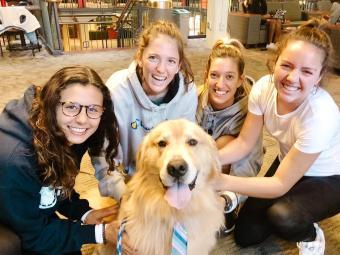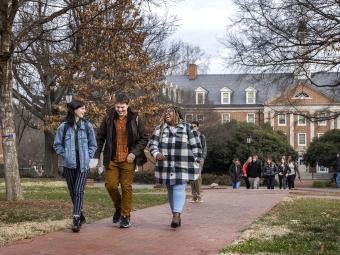
Frequently Asked Questions
You're bound to have questions about life at ĚŇń«ÉçÇř. Explore these commonly asked questions and our answers.
Should your own inquiries be more specific, don't hesitate to call or email one of our admission staff.
Admission and Financial Aid Questions
What does ĚŇń«ÉçÇř look for in an application for admission?
Admission officers engage in a holistic review of each applicant. Applications are examined thoroughly by individual readers and are then discussed in committee settings, sometimes at great length. These discussions give us a better sense of each applicant as an individual and as a potential member of our student body.
We emphasize certain factors in the review of an application, such as the difficulty of high school course selection, and depth and breadth of extracurricular pursuits.
Does ĚŇń«ÉçÇř require SAT/ACT in its application?
No. ĚŇń«ÉçÇř is test optional, and we mean it.
For students who want to submit testing, does ĚŇń«ÉçÇř accept self-reported SAT and ACT scores?
Yes. For the admission process, ĚŇń«ÉçÇř will accept scores reported on the application, by the counselor, or sent by the student as a PDF via email to admission@davidson.edu.
All enrolling students must submit official test scores if available.
How many students applied last year? How many were admitted?
We received 6,475 applications for the class of 2026. We admitted 1,096 students for an overall acceptance rate of 16.9 percent and enrollment yield of 49.8 percent.
How should I apply? When will I hear?
We offer Early Decision I, Early Decision II, Regular Decision, and Transfer admission plans. Explore all of the ways to apply and the associated dates and deadlines, including application and notification dates.
Is there a selectivity advantage to applying Early Decision?
Statistically speaking, yes. A higher percentage of our applicants are admitted under an early decision plan than under regular decision.
If admitted, may I defer my admission or take a gap year?
Yes, and we are big fans of gap year experiences. Approximately 6 students in each incoming class opt to take gap years. An admitted first-year student may, with the permission of the Dean of Admission, defer matriculation for one year. The student must confirm his or her intent to enroll at ĚŇń«ÉçÇř, submit the required $1,000 enrollment deposit, and a written request for deferral by May 1. The request must detail the student's plans for the interim year, inclusive of programs, locations and dates. If the deferral request is approved, the student must return a signed deferral contract, coupled with an additional non-refundable deposit in the amount of $1,500, within one week of the notice of approval.
First-year students offered admission from the wait list and all admitted transfer students are not eligible to defer.
Can I submit an arts portfolio as part of my application to ĚŇń«ÉçÇř?
Yes. We invite you to share your interest and engagement in the arts (creative writing, dance, music, theatre, and visual art) by completing the and subsequently uploading a portfolio through your ĚŇń«ÉçÇř applicant portal. You can read more about the Arts Portfolio Guidelines here.
What should I do if I have questions or concerns about my financial aid award?
First, you can always call our office and speak to a financial aid counselor—we are happy to help. Call 704-894-2232.
ĚŇń«ÉçÇř is intentional in awarding need-based and merit aid, meeting 100% of calculated financial need. If, however, you believe that there has been an error in the calculation of financial need, you may submit an online request for a .
Academics & Student Life Questions
Are there resources available for Undocumented and DACA students?
ĚŇń«ÉçÇř continues to expand its resources and expertise in supporting the development and education of undocumented students and students with Deferred Action for Childhood Arrivals (DACA) status. We encourage interested applicants to apply for admission regardless of their immigration status and for admitted students to explore the following resources.
What courses and majors are offered?
ĚŇń«ÉçÇř offers 31 majors and the opportunity for students to design their own major through the Center for Interdisciplinary Studies. In addition, ĚŇń«ÉçÇř offers over 40 minors, including 15 interdisciplinary minors.
Do you offer graduate programs? Will I have contact with professors?
We do not offer graduate programs, allowing our professors to focus solely on the undergraduate. Our professors are terminal degree-holding faculty members in classes normally capped at 35 students. We are proud of our student-to-faculty ratio of 10:1.
Our professors are expected to be available often-usually via established office hours. It is common for them to provide their phone numbers, welcome students into their homes to share meals, and to invest in the lives of their students outside of the classroom. This personal connection is a hallmark of our community.
Are there study abroad programs?
Nearly 80 percent of our students will travel internationally through our numerous academic programs abroad.
Our Dean Rusk International Studies Program funds student travel and research abroad. More than $200,000 is set aside annually for travel grants.
What about opportunities for significant research?
We are consistently recognized for excellence in undergraduate research. Throughout the academic year-and in the summertime-you will have the opportunity to carry out directed research projects.
While being mentored by our professors, you will contribute substantively and originally to the academic world, perhaps even presenting your work at conferences and association meetings, or publishing your work in academic journals.
Our Research Initiative supports student research. Funded by a $750,000 grant from the Duke Endowment, it enables you to pursue research opportunities in biology, chemistry, ecology, neuroscience, and public policy (to name a few) for up to ten weeks over the summer.
Tell me about the advising system.
You will find a great network of academic support. During your first year, you are assigned an academic adviser at random; that adviser helps with course selection and acclimation to academic life.
You are required to declare a major by the end of your sophomore year and will then solicit your own academic adviser.
What sorts of student groups exist on campus?
We have more than 200 student-run organizations. Among them are:
Academic groups
Affinity organizations
Arts & leisure groups
Civic engagement organizations
Gender & sexuality groups
Sports teams
Health & wellness organizations
Media outlets (television, newspapers, radio)
Fraternities, sororities, and eating houses
Performance groups
Political organizations
Religious organizations
From Amnesty International to Queers & Allies; and from Androgyny, a co-ed a cappella group, to the ĚŇń«ÉçÇř Mock Trial Association, we offer great experiences outside the classroom.
What about the surrounding area?
The town of ĚŇń«ÉçÇř offers everything you need within walking distance: coffee shops, an independent book store, Ben & Jerry's, several pizza joints, a sushi bar, several restaurants, an organic grocery store, and a pharmacy.
Just down the interstate, Charlotte, with its NFL and NBA teams, dynamic arts scene, and vibrant nightlife, provides a big-city supplement to ĚŇń«ÉçÇř social life. ĚŇń«ÉçÇř is situated just 20 minutes north of center-city Charlotte. It is easily accessible by public transportation.
The Appalachian Mountains lie less than two hours to the west and the Atlantic Ocean is within an afternoon's reach.
With a temperate climate, all the cultural offerings of a major city, and quick access to an international airport, the Appalachian Trail and the Outer Banks—it's clear that you'll reap the benefits of a highly desirable location.
What is there to do for fun?
Between our residential campus, access to the growing hub of Charlotte, and nearby destinations like Lake Norman and the U.S. National Whitewater Center, our students have a multitude of social options including:
- Nightly events at the Alvarez College Union
- Fraternities, sororities, and eating houses
- NCAA sporting events
- Artist series
- Visiting lecturers
- Arts and cultural groups
Our campus calendar includes a full list of activities. During the late summer and spring, you can enjoy beach volleyball, grilling, or lounging with friends on the "peninsula" at Lake Norman.
Is ĚŇń«ÉçÇř an NCAA Division I college?
We are Division I in all 21 varsity sports, and just over 25 percent of our student body is involved in varsity athletics. You will also have the opportunity to participate in club or intramural sport offerings. The combination of outstanding facilities and school spirit makes ĚŇń«ÉçÇř an exciting place year-round.
Tell me about residence life.
More than 95 percent of our student body lives on campus, and you are required to do so during your first year.
Within our 19 residence halls, rooms vary from traditional dormitory-style "doubles" to suite-style and single rooms. Apartments are available for seniors. Housing preferences are given based on a yearly lottery. Most housing is double occupancy, though some single and triple occupancy rooms exist.
Gender Neutral Housing is a housing option in which two or more students share a multiple-occupancy apartment or suite, or specifically designated halls regardless of the students' sex, gender, gender identity, or gender expression.
We also offered substance-free halls and an environmental co-op house. All buildings are wireless and, of course, air-conditioned.
We feature a unique first-year roommate selection process: the results from a personality exam (the Myers-Briggs Type Indicator) are factored into roommate pairings.
Talk to me about diversity at ĚŇń«ÉçÇř.
We believe that the college experience should be based on bringing different kinds of people together to learn from one another, and we are committed to building a diverse academic and social community.
While the true diversity of background and experience comprising our community can never be reduced to a few statistics, it may be helpful to see a snapshot:
Ethnic Backgrounds
African American: 8.4%
Asian American: 6.2%
Caucasian: 67.8%
Hispanic /Latino: 7.8%
International: 7.0%
Native American: 0.6%
Other or Unreported: 2.8%
Geographic Distribution
Mid-Atlantic: 11.4%
Midwest: 6.0%
Northeast: 20.5%
Southeast: 43.1%
West: 9.1%
International: 9.9%
How religious is ĚŇń«ÉçÇř?
We maintain a connection with the Presbyterian Church-USA. That connection values the life of the spirit, but necessarily demands an openness to and respect for the world's various faith traditions.
However you identify yourself in a religious sense — from Jewish to spiritual to Roman Catholic to atheist to Buddhist — it is likely that others view life from a similar perspective. Many make religious practice a part of college life. Many do not.
Every week, our campus plays host to a Presbyterian worship service, a Catholic mass, a Muslim prayer meeting, an Episcopal Eucharist, and a Quaker meeting. Shabbat services and Hillel Fellowship programming are also staples of our on-campus religious life.
Within walking distance and in nearby Charlotte, you can find services and meetings that touch many other religious and cultural traditions.
Additionally, there are many student organizations that focus on faith and religion.
ĚŇń«ÉçÇř has a reputation for academic challenge. How hard is it?
At ĚŇń«ÉçÇř you will be challenged - as you should be. That challenge will be both manageable and exciting, if you are engaged academically in the things that you're passionate about.
You'll look back on the time you spent reading, discussing, writing, probing, and debating with a sense of satisfaction and accomplishment.
There will be free time. Students often cite the time they spent outside of class - running track, planning fundraisers, spending time with friends, writing music, going to basketball games, and tutoring elementary school children - as the reasons they loved their ĚŇń«ÉçÇř experiences.

